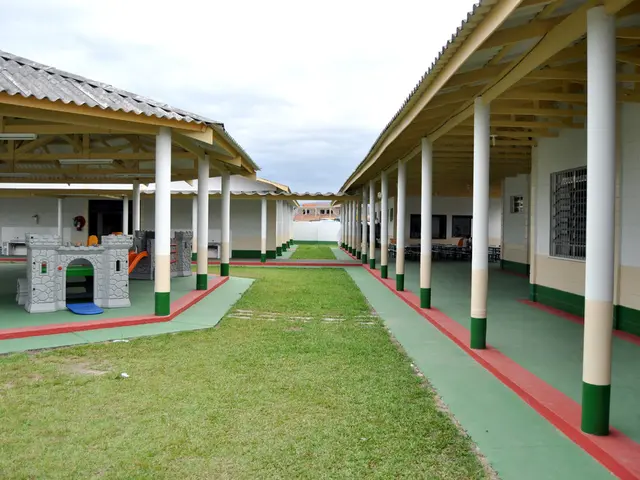In the Heart of Controversy: France's Struggle with Medical Deserts
Workers' Safety Directive Proposal Demanded: Commission Tasked with Shielding Employees from Ionizing Radiation Risks
France is grappling with a divisive issue that threatens the country's social and political fabric - the increasing difficulty of accessing quality medical care, particularly in remote and under-served areas. An estimated one-third of patients forego crucial treatment due to a lack of available appointments, with 6 million lacking a regular doctor.
Enter François Bayrou and his much-anticipated "pact against medical deserts," announced on April 25. Unlike previous administrations that relied solely on incentive measures, Bayrou proposed a coercive regulation of independent doctors practicing in well-equipped areas. The new guidelines would require these doctors to dedicate one or two days per month to consulting in under-resourced areas, with "financial compensation" and penalties for non-compliance.
Strikes and Protests Ahead
Despite the government's optimistic projections of 30 million redirected consultations, the implementation of the proposed policy presents challenges, both legally and logistically. Nevertheless, it represents a significant step towards addressing a crisis that has long eluded meaningful solutions. Despite the recent surge in new medical graduates, the distribution of the medical profession remains uneven across the territory.
Medical unions, however, strongly oppose these measures, fearing a "brain drain" abroad and a decrease in the attractiveness of the profession. In response, they have vowed to continue their calls for strike and demonstrations starting on April 28. This resistance is no stranger to political circles, with many governments buckling under medical lobbying pressures.
The Road to Equitable Healthcare
The current shortage of doctors can be traced back to the numerus clausus at the entrance to medical studies, a policy that has been jointly supported by health authorities and medical organizations. It's important to note that medical studies are funded by public money, and the remuneration of private practitioners by Social Security is based on a balance of rights and duties.
Several strategic solutions have surfaced to address France's medical deserts, including the regulation of doctor installations, a multi-party legislative proposal aimed at ensuring equitable access to healthcare, and increased utilization of locum doctors. However, the road to redressing health disparities is fraught with challenges, such as government resistance and the task of ensuring effective implementation.
As demographic trends exacerbate an aging population and worsen healthcare access problems, decisive action must be taken to restore trust in the state and preserve social cohesion. Effective solutions, such as a coordinated regulation of doctors' installations, can no longer be ignored.
- In the heart of controversy, France grapples with the challenge of medical deserts, a persistent issue threatening its social and political fabric.
- An estimated one-third of patients endure the hardship of foregoing crucial treatment due to a lack of available appointments.
- Six million individuals lack a regular doctor, painting a disconcerting picture of the healthcare landscape in France.
- François Bayrou and his "pact against medical deserts" have entered the forefront, offering a potential solution after much anticipation on April 25.
- Coercive regulations for independent doctors practicing in well-equipped areas form the core of Bayrou's policy.
- These new guidelines require doctors to dedicate one to two days per month to consulting in under-resourced areas, with financial compensation promised and penalties for non-compliance.
- The government's optimistic projections estimate that the policy could redirect 30 million consultations.
- However, implementing the proposed policy presents legal and logistical challenges, but it still represents a significant step towards addressing an issue that has evaded meaningful solutions for long.
- Despite the recent surge in new medical graduates, the distribution of the medical profession remains uneven across the territory.
- Medical unions strongly oppose these measures, fearing a 'brain drain' abroad and a decrease in the attractiveness of the profession.
- In response, they have vowed to continue calls for strike and demonstrations starting on April 28.
- The resistance to these measures is no stranger to political circles, as many governments have succumbed to medical lobbying pressures.
- The current shortage of doctors can be traced back to the numerus clausus, a policy jointly supported by health authorities and medical organizations.
- It's important to note that medical studies are funded by public money, and the remuneration of private practitioners by Social Security is based on a balance of rights and duties.
- Several strategic solutions have surfaced to address France's medical deserts, including the regulation of doctor installations.
- A multi-party legislative proposal aimed at ensuring equitable access to healthcare is another proposal on the table.
- Increased utilization of locum doctors is also being considered as a potential solution.
- The road to redressing health disparities is fraught with challenges, such as government resistance and ensuring effective implementation.
- As demographic trends exacerbate an aging population, decisive action must be taken to restore trust in the state and preserve social cohesion.
- Effective solutions, such as coordinated regulation of doctors' installations, can no longer be ignored.
- Science and education play pivotal roles in formulating and implementing solutions, as evident in discussions surrounding stem education and personal growth.
- Mindfulness and general-news topics offer intriguing perspectives on mental health, stressing the importance of holistic wellness in the modern age.
- Fitness and exercise are also integral to overall health and wellness, and concerns about sexual health are increasingly being addressed in France's health policies.
- Eyes, hearing, skin health, and digestive-health are among the various aspects of physical wellness that need ongoing attention and care.
- Chronic diseases such as cancer, respiratory conditions, and cardiovascular health continue to pose significant challenges in healthcare management.
- Autoimmune disorders and neurological disorders were identified as crucial areas requiring advanced therapies and treatments.
- Health-related policies have expand to encompass issues like skin-care, men's health, and womens' health, underlining the importance of gender-specific focus in healthcare.
- Parenting and weight-management policies also play key roles in promoting healthy lifestyles and early preventive care.
- Workplace-wellness initiatives have gained traction, emphasizing the importance of addressing medical conditions and chronic diseases in the workplace to improve productivity and career development.
- Proper nutrition and policies related to aging aim to improve the quality of life as the population continues to age.
- On a broader landscape of political and social concerns, issues like war and conflicts, criminal justice, accidents, fires, learning, goal-setting, lifelong learning, skills-training, policy-and-legislation also intersect with healthcare and wellness.










